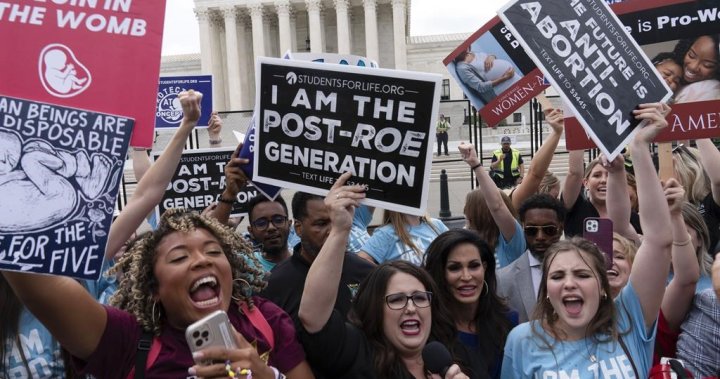
Abortion rights advocates and opponents seeks next step after Roe v. Wade overturn
Global News
Abortion rights advocates across the U.S. say the fight for health reproductive rights continues as some abortion clinics in certain states have closed doors on clients.
Americans were taking stock a day after the Supreme Court overturned a woman’s constitutional right to an abortion, as states began implementing bans and supporters and foes of abortion rights mapped out their next moves.
The depth of emotion unleashed by Friday’s decision led to protests and prayer vigils across the country, with Arizona lawmakers even hiding in a basement for a time while police fired tear gas into a crowd.
In Charleston, West Virginia, at least 200 abortion supporters gathered Friday night for a candlelight vigil in front of the federal courthouse after the state’s last abortion clinic was forced to cancel all of its appointments.
Katie Quinonez, executive director of Women’s Health Center of West Virginia, told the crowd she threw threw her phone against the wall of her office when she learned that Roe v. Wade had been overturned after almost 50 years. Her staff called 70 patients scheduled over the next month “to tell them that their abortion was cancelled and we would have to send them out of state, and that was it.”
Quinonez vowed that the fight for abortion rights will continue: “This is not the end whatsoever… Tonight we mourn, we rage. Tomorrow we get to work.”
In Arizona, thousands of demonstrators — split between those who support and oppose abortion rights —gathered outside the state Capitol on Friday night. Police fired tear gas to disperse anti-abortion demonstrators who banged on the glass doors of the Senate building, and lawmakers, rushing to complete their 2022 session, huddled briefly in a basement.
Clinics in Arizona stopped performing abortions after the decision, as did those in Alabama, Arkansas, Kentucky, Missouri, South Dakota, West Virginia and Wisconsin. Women considering abortions already had been dealing with a near-complete ban in Oklahoma and a prohibition after roughly six weeks in Texas.
In Ohio, a ban on most abortions from the first detectable fetal heartbeat became law when a federal judge dissolved an injunction that had kept the measure on hold for nearly three years. Another law with narrow exceptions was was triggered by the ruling in Utah and went into effect.













